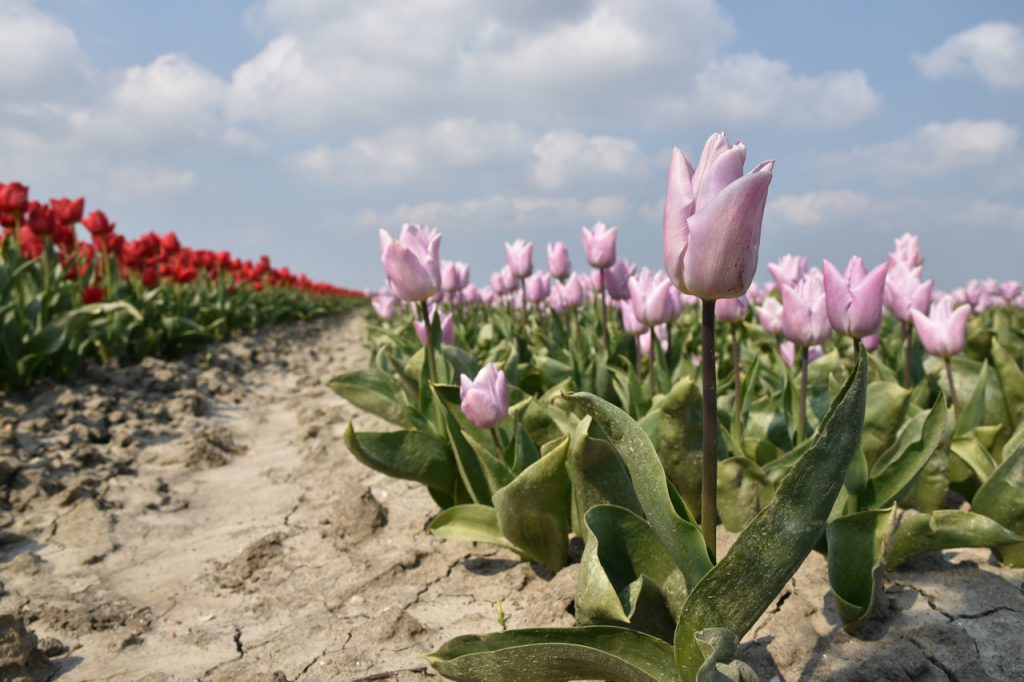
A solution for clean water in the flower bulb sector
The Dutch flower bulb sector is facing a number of challenges, including the quality of the wash water used. When flower bulbs are harvested, a large amount of soil is still attached. When this soil is washed off, fungi, viruses (such as acid and PIAMV) and pesticide residue get into the water. In this way, these substances may be transported from the land around the bulb company onto the fields and into the wash water. An almost insurmountable problem that is difficult to solve.
A recent report from the RIVM* (Dutch National Institute for Public Health and the Environment) indicates that in the case of certain types of arable farming, including bulb cultivation, the percentage of measurements exceeding the norm is particularly high – between 80 and 90%. According to a recent report from sustainability organization Nature & Environment, pesticides used in, among other things, bulb cultivation are frequently found in the national monitoring network measuring wells. In recent years, 60% of these monitoring points have been found to exceed the maximum standard for pesticides – particularly in areas with flower nurseries, bulb growers, greenhouse horticulture and open ground vegetable growing. These levels should be reduced to zero within four years, according to the European Water Framework Directive.
In addition, stricter guidelines for the ‘stacking’ of pesticides are being introduced, making it more difficult to combat certain diseases. **Stricter rules concerning discharge are also being introduced. The relevant authorities want to work towards zero discharge, or a closed water cycle without wastewater emissions. If discharges can’t be avoided, they should be minimal and conform to with strict standards.
That is why the Koninklijke Algemene Vereeniging voor Bloembollencultuur (Royal Dutch Association for Flower Bulb Culture) has introduced the ‘Schoon erf, schone sloot’ (‘Clean field, clean ditch’) project. Between 2016-2020, 450 flower bulb growers in the Netherlands will reduce the emission of plant protection products by at least 80%. This improves the quality of ground and surface water.
Cleansing wash water of pesticides, fungi and viruses leads a reduction in the use of plant protection products, lower impact on the environment and improved yield. In short: clean water helps tackle the challenges facing the bulb sector. However: using clean water every time a harvest comes in entails high costs and places a burden on the environment.
This is less than desirable for the bulb sector, where cost and a ‘green’ image are important competitive advantages.
Reusing purified water offers a solution to all of these challenges. VAM offers a practical solution. In a recent project called ‘Duurzame Waterkwaliteit’ (‘Sustainable Water Quality’), VAM WaterTech has delivered an installation that treats and disinfects a bulb grower’s field water and wash water, so that it can be reused in the rinsing process, or for spraying fields or cleaning machines. Currently, studies are being carried out to establish whether the excess water is suitable for discharge and which standard it should meet. The purification process consists of several steps: first, sand is removed with the current basin or with a cyclone installation. Remaining soil particles are removed next, and the cleaned water is disinfected. The water is cleared of fungi, viruses and pesticide residues. This approach helps reduce diseases, which in turn results in reduced use of plant protection products and more options for water use, in the washing process and on site. In this way, VAM WaterTech is also making a contribution to a healthy and clean bulb cultivation.
Contact VAM for more information or to discuss your own wishes!
* https://www.rivm.nl/bibliotheek/rapporten/2019-0044.pdf
** https://edepot.wur.nl/472625
Hans Blaak
phone: +31 (0) 113 – 65 58 80
email: hb@vam-watertech.com
or use our contact form.
